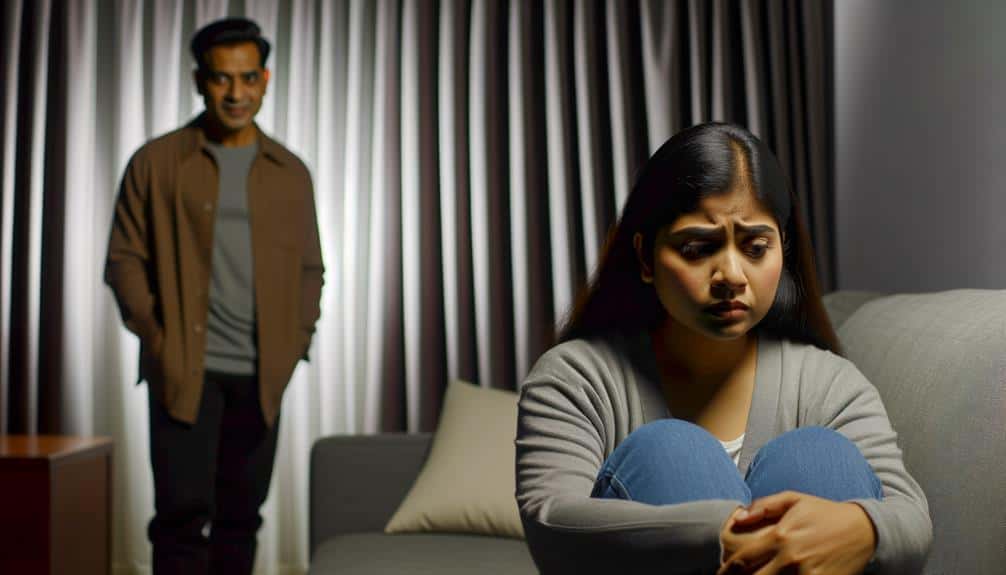
Emotional abuse is a stark reality for many households affected by family violence, inflicting lasting harm on victims’ emotional and mental health.
In Alberta, more clarity has been provided for those seeking accountability and restitution for the scars left by family violence.
As you navigate through the complexities of this evolving legal landscape, you will witness the profound impact of holding perpetrators of emotional abuse liable.
Key Takeaways
- The Court overturned the tort of family violence, deeming existing torts like battery sufficient.
- Courts are giving more recognition to the complexities of intimate partner violence and family violence.
- While existing torts were deemed adequate, the courts generally focus on the complexity of family violence when ruling in legal proceedings.
- There is a greater emphasis on condemning family violence, providing remedies, and reflecting society’s evolving understanding of these issues.
Legal Landscape in Alberta
In Alberta’s legal landscape, the recognition and denouncement of family violence are paramount in shaping the judicial approach to intimate partner violence cases. Understanding the nuances of intimate partner violence, including physical, psychological, and financial abuse, is crucial in legal proceedings. While existing torts like battery and assault are deemed sufficient to address family violence issues, the recognition and condemnation of family violence play a vital role in ensuring justice for survivors.
Courts must acknowledge the complexities of family violence, including the repetitive nature and breach of trust involved. Advocates, like the Barbra Schlifer Commemorative Clinic, highlight the inadequacies of existing torts in capturing the long-term and dominating aspects of family violence. Legal proceedings must navigate these complexities, balancing the need for justice with the evolving societal views on intimate partner violence over the years.
Recognizing and addressing family violence through existing torts is essential in providing remedies and condemning intimate partner violence effectively. As legal precedents evolve, the judicial system must continue to condemn intimate partner violence and provide survivors with the necessary support and justice they deserve.
Family Violence Definition in Tort Law
Navigating the legal landscape in Alberta requires a comprehensive understanding of the definition of family violence in tort law in order to address the complexities of intimate partner violence cases effectively. The family violence definition encompasses a range of abusive behaviours, including physical, emotional, psychological, and financial abuse within intimate relationships. It also considers coercive control, which involves tactics used by abusers to dominate and manipulate their partners. Legal definitions surrounding family violence aim to capture the repetitive nature and breach of trust that often characterize these abusive situations.
Recognizing and defining family violence in legal contexts is crucial for providing survivors with avenues to seek justice and remedies for the harm they’ve endured. By establishing a clear understanding of what constitutes family violence within the legal framework, individuals can better advocate for themselves and hold perpetrators accountable for their actions. Understanding the nuances of the family violence tort definition is essential in addressing the long-term and dominating nature of intimate partner violence cases.
Judicial Interpretation and Precedents
How do judicial interpretation and past legal precedents shape the landscape of family violence tort cases in Alberta?
The Ontario Court of Appeal decision in the Ahluwalia v Ahluwalia case overturned a tort claim for family violence, asserting that existing torts like battery, assault, and intentional infliction of emotional distress were sufficient. Alberta’s Court of King’s Bench agreed with the Ontario Court of Appeal and rejected the application of the tort of family violence in Colenutt v Colenutt.
This highlights the importance of legislative changes over judicial creation in addressing intimate partner violence. Legal precedents, such as the Ahluwalia case, influence how family violence is addressed within the legal system. The contrast between different rulings, like the decision in Leitch v Novac, showcases the evolution of societal, legislative, and judicial understanding of intimate partner violence. These precedents are vital in condemning intimate partner violence and providing appropriate remedies for survivors. Understanding these legal precedents is essential for navigating family violence tort cases and advocating for effective justice in cases of intimate partner violence.
Liability and Compensation Rulings
Discussing the liability and compensation rulings in family violence tort cases involves a detailed examination of the legal outcomes and awards granted to survivors.
When it comes to family violence tort cases, the following aspects are crucial to consider:
- Compensatory Damages: These are awarded to compensate survivors for the harm and losses they’ve suffered due to the family violence. They aim to restore the survivors to the position they’d have been in if the violence hadn’t occurred.
- Aggravated Damages: These damages go beyond compensating for the harm done and are meant to address the defendant’s conduct’s particularly egregious or malicious nature. They acknowledge the additional harm caused by the defendant’s behaviour.
- Punitive Damages: These damages are intended to punish the wrongdoer for their actions and deter them from engaging in similar conduct. They serve as a way to send a message that such behaviour won’t be tolerated in society.
Challenges and Stereotypes Addressed
Addressing the challenges and stereotypes surrounding family violence requires a nuanced understanding of survivors’ experiences and the impact of societal perceptions.
Family violence stereotypes often perpetuate misconceptions about the nature of abuse, leading to victim-blaming and disbelief.
Legal definitions play a crucial role in shaping how intimate partner violence is recognized and addressed within the legal system.
Societal understanding of intimate partner violence has evolved over the years, but there are still deep-rooted stereotypes that can hinder survivors from seeking justice and support.
Impact on Survivors and Legal System
Navigating the impact of family violence on survivors within the legal system requires a comprehensive understanding of the challenges they face and the crucial role legal definitions play in shaping their experiences. When survivors engage with the legal system, they encounter a myriad of complexities that can significantly affect their journey toward justice.
- Family Violence Recognition: Acknowledging the various forms of family violence, including physical, psychological, and financial abuse, is essential for survivors to receive the support and validation they deserve.
- Legal Precedents: Understanding the legal precedents set in cases related to family violence can influence the outcomes of survivors’ claims, highlighting the importance of past judgments in shaping current legal practices.
- Liability and Damages: Determining liability and assessing damages in cases of family violence can be a challenging process, impacting survivors’ ability to seek restitution for the harm they’ve endured.
Future Directions and Advocacy
In shaping the future landscape of legal responses to family violence, a concerted effort toward advocating for survivor-centred policies and robust legislative reforms is paramount. The recognition of psychological abuse in Alberta and the need to sue for emotional distress in Alberta within family law proceedings are crucial steps toward addressing coercive and controlling behaviour. By prioritizing survivor-centred approaches, the legal system can better address the multifaceted challenges victims face, especially in cases involving coercive dynamics. For instance, divorcing a narcissist in Canada often requires nuanced legal strategies to uncover patterns of psychological manipulation and ensure fair outcomes in custody and asset division. Strengthening legal protections and awareness around such complexities is essential for fostering a more equitable and supportive framework for survivors.
Advocacy efforts should focus on ensuring that survivors have the necessary legal mechanisms to seek justice and reparations for the emotional trauma they’ve endured. It’s imperative to highlight the long-lasting effects of psychological abuse and the complexities it adds to legal proceedings.
Frequently Asked Questions
Can Children Who Have Witnessed Family Violence Also Bring a Claim for Emotional Abuse in Alberta?
Yes, children who’ve witnessed family violence can bring a claim under tort law in Alberta.
This allows them to seek justice for the harm they’ve experienced due to witnessing such traumatic events.
It acknowledges the lasting impact of family violence on children and provides them with a legal avenue to address their emotional and psychological suffering.
Are There Specific Factors or Criteria Considered When Determining Punitive Damages in Cases Involving Emotional Abuse?
Specific factors are considered when determining punitive damages in cases of emotional abuse. These may include the severity of the abuse, the impact on the survivor’s well-being, the pattern of behaviour exhibited by the perpetrator, and the need to deter similar conduct in the future.
Courts aim to provide a remedy that not only compensates the survivor but also sends a strong message against intimate partner violence.
How Does Tort Law in Alberta Intersect With Existing Criminal Charges or Convictions for Domestic Abuse?
When tackling the intersection of tort law in Alberta with existing criminal charges or convictions for domestic abuse, it’s crucial to understand how these legal aspects can coexist and influence each other.
The tort law provides a civil avenue for seeking justice beyond criminal proceedings, enabling survivors to pursue compensation and hold perpetrators accountable in a different legal realm.
Navigating these intertwined legal paths demands a nuanced approach and thorough legal expertise.
What Support or Resources Are Available to Survivors Pursuing a Claim For Emotional Abuse, Particularly in Terms of Legal Aid or Advocacy Services in Alberta?
If you’re in Alberta and need support to pursue a claim for emotional abuse, there are resources available. Legal Aid services offer assistance with navigating the legal process and advocating for your rights.
Organizations like shelters, crisis hotlines, and counselling services can provide emotional support and guidance.
Connecting with advocacy groups specializing in family violence can offer valuable resources and information tailored to your situation.
Conclusion
In conclusion, while courts in Alberta did not accept the new tort of family violence, the rulings in the cases discussing this issue represent a crucial step toward holding perpetrators of emotional abuse accountable and providing justice for survivors.
Through evolving legal definitions, judicial interpretations, and compensation rulings, this legal landscape is empowering survivors to seek restitution and challenge societal stereotypes.
By recognizing and addressing various forms of abuse within familial relationships, we’re moving towards a future where survivors can find closure and the legal system can effectively combat intimate partner violence.
References
Ahluwalia v Ahluwalia, 2023 ONCA 476
https://www.canlii.org/en/on/onca/doc/2023/2023onca476/2023onca476.html
Colenutt v Colenutt, 2023 ABKB 562
https://www.canlii.org/en/ab/abkb/doc/2023/2023abkb562/2023abkb562.html
Leitch v Novac, 2020 ONCA 257
https://www.canlii.org/en/on/onca/doc/2020/2020onca257/2020onca257.html

We currently have three offices across Alberta — Edmonton, Calgary, and Red Deer. We serve the entire province of Alberta (and BC). We also have the infrastructure to work with any of our clients virtually — even the furthest regions of Alberta.
Call 1 (855) 892-0646 (toll free) to get routed to the best office for you or contact us online for general inquiries.
We also have a dedicated intake form to help you get the ball rolling. Our intake team will review your specific case and advise you on the next steps to take as well as what to expect moving forward. That’s the best way to schedule an appointment
Our offices are generally open 8:30 a.m.—4:30 p.m., Mon—Fri.


Shantale D’Aoust
FAMILY LAWYER
Shantale has vast advocacy and litigation experience. She strives to help her clients navigate through their legal issues by assessing risks to provide practical options so they can take back control of their lives.
The Legal Review Process by Spectrum Family Law
- Spectrum strives for high-quality, legally verified content.
- Content is meticulously researched and reviewed by our legal writers/proofers (usually local law students).
- Details are sourced from trusted legal sources like the Family Law Act.
- Each article is edited for accuracy, clarity, and relevance.
- If you find any incorrect information or discrepancies in legal facts, we kindly ask that you contact us with a correction to ensure accuracy.


